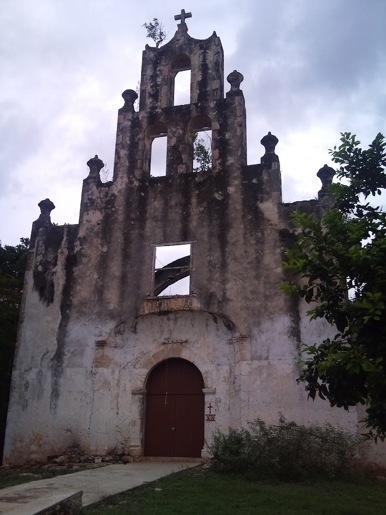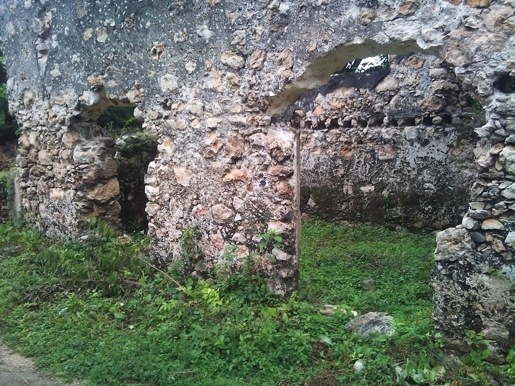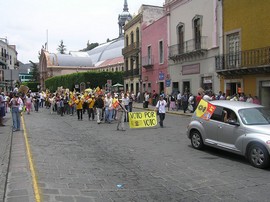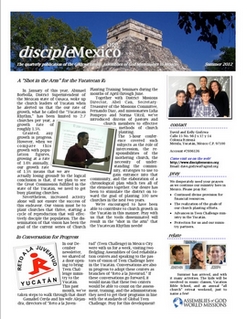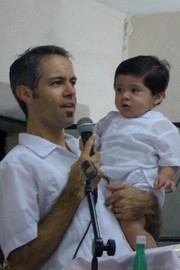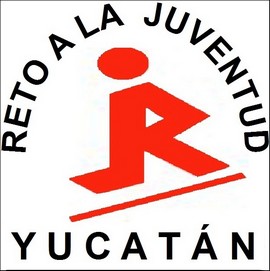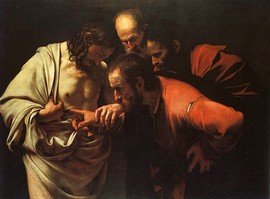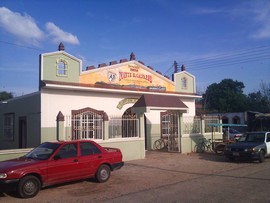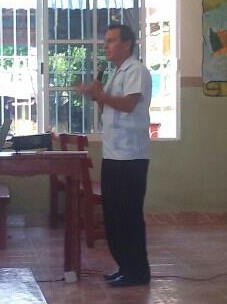Below is the translated text from a recent sermon that I felt led to share. I pray that it’s a blessing:
Some weeks ago we navigated through some days of tremendous struggle. Without giving details, the news of events effecting people close to us left us with a profound sense of disappointment and with it a great deal of sadness. It’s at times like these when we struggle with doubt. When we ask ourselves questions like:
“What are we doing?”
“Why are we here?”
But are we not all equal? It’s easy to have faith when everything is going according to our plans–when there is money in the bank, when there is food in the kitchen, when we are in good health, and when the kids are asleep. But when things go wrong–when the bills arrive, or when a friend lets you down, or when your problems seem to evade resolution, we feel overwhelmed. It’s times like these when doubts appear.
Doubting Thomas
That’s what we see in principle character of John 20:24-29. Thomas, also known to his friends as Didymus, or “the Twin,” is probably best remembered by history as “Doubting Thomas,” but his previous life does not paint that picture. In the Gospel of John, we see how he was chosen as one of the twelve who stuck by Jesus even when others felt that his words were too difficult to accept. He stands there with the others in John 6:68 as Peter says, “Lord, to whom shall we go? You have the words of eternal life” He had left everything to follow Jesus, even the approval of its people.
He is also portrayed as one determined to give his life for Jesus. In John 11, when Christ made the decision to return to Jerusalem, understanding that the Pharisees wanted to stone him there, it was Thomas who encouraged his colleagues in verse 16: “Let us also go, that we may die with him.” Therefore, analyzing the evidence, seeing his sacrifice and selflessness, perhaps instead of calling him “Doubting Thomas” we might call him “Thomas the Brave.”
Doubts affect us all
But we find that doubt that affects everyone, even the bravest, The Bible is full of their accounts: Judges 4 records that Barak, a warrior, mighty in battle, a leader of Israel, refused to attack the enemies of God until the woman, Deborah, promised to go with him to war. Just a bit further, in Judges 6 and 7, we find that Gideon, the man who defeated an army with only 300 men, needed 3 signs from God before he was convinced that he would be granted the victory. We also read of Elijah the prophet, who defied an apostate nation and saw the fire of God fell from heaven, tremble with fear when he received a threat from Jezebel the pagan queen.
And if the mighty in battle, those who conquered kings, and put to flight the enemies of God, could not escape doubt, how can we think that we are safely beyond it’s reach? In reality, doubt is closer than we think. It can grasp us while in the valley of defeat, as David’s companions when they found their city sacked and their families taken hostage, but it can even reach us on the mountain of victory as it did the prophet Elijah after he conquered the prophets of Ba’al. That means that no one is immune to its effects, not even the “superstars”
The “yips” of Chuck Knoblauch
Let me tell the story of Chuck Knoblauch. In the year 1998, he was a baseball player at the peak of his talent. Having honed his skills with the Minnesota Twins, he was hired by the New York Yankees to provide an offensive spark to their lineup and a solid defense at second base, the same defense that won him the gold glove the previous year.
So strong was his talent on the field that he was named “Fundamentally Sound Knoblauch.” He was hoped to become, not only an essential piece of the puzzle in the return of the Yankees to the championship, but also a legend among the infielders. That was, until he forgot to how throw the ball to first base.
Throw the ball to first base, it’s a movement that an infielder has to make thousands of times in his career. It becomes routine, something that he should be able to do without thinking, but, for some reason, that throw came to consume all of his concentration, and even still, he often missed the target. The interesting thing was that it seemed that the problems appeared in the simplest moves, when he had time to think about what he was doing–when he had the time to doubt that he could make the throw.
Taking it all into consideration, we could say that doubt is so common among all walks of life that, as with problems, we find that we are either about to deal with doubt, in the middle of a fight with it, or just finishing another round with this enemy of our soul.
The danger of doubt
But even though doubt is a common opponent, we should not minimize the risk because as common as it is, it is just as dangerous.
It can lead to abandon the faith that gives us life. Faced with the threat of soldiers and arrest at the hands of the authorities, we see that all his disciples, including Thomas, left Jesus, fearing that He who calmed the storm could not keep them safe from the Jewish authorities.
It can steer us toward denying the on who gave everything to purchase our forgiveness. Concerned with the implications of an association with the convicted, we see that Peter denied three times that he even knew Jesus rather than surrender his fate to the one who controls eternity.
It has the power to make us ignore any evidence that contradicts our conclusions, even they are erroneous. Let’s take a look at the famous words of Thomas in John 20:25:
“Unless I see the nail marks in his hands and put my finger where the nails were, and put my hand into his side, I will not believe.”
Jesus had risen, the tomb was empty, and all his companions had confirmed it, but Thomas chose to remain in his unbelief eight more days, carried away by doubt.
It does not stop until it has taken everything from us. A survivor of the holocaust, the Jewish psychologist Victor Frankl noticed something about his companions in the Nazi concentration camps. He saw that, although the physical condition had something to do with survival, the most important factor was faith. Those who could not see beyond their existence in the camps, those who had lost their hope, those who remained in doubt, were also those who lost their lives
An action to take
But our story does not need to finish this way. We don’t have to surrender to the effects of the doubt, but to avoid lasting consequences we must take action; we have to be honest.
We must admit that we doubt.
We must admit that we doubt because it’s only in expressing our concerns that we see that what was before an indistinct and terrifying force becomes something concrete, something treatable:
The disciple Nathanael who said, “Nazareth! Can anything good come from there?” was told, “Come and see.”
The father of the demon-possessed child who said, “I do believe; help me overcome my unbelief!” was given the necessary assistance.
And Doubting Thomas who said “Unless I see the nail marks in his hands and put my finger where the nails were, and put my hand into his side, I will not believe.” Was given another opportunity.
We don’t do ourselves any favors by bottling up our doubts, keep them inside to destroy us from within. We need to expose them, to see them as they are and declare our inability to overcome them.
God has never used any superhero to do his will, only men and women aware of their disabilities in the face overwhelming situations. And right there in the statement of our poverty and humble prayer, God is presented in all its power.
Hezekiah’s need
II Kings tells the story of King Hezekiah. His kingdom had been conquered, his city was besieged by his enemies, and he was holding in his hands the letter that was to seal his destruction. What did he do? Did he tear the letter into pieces? Did he hide it in a drawer? No, he laid it out before the Lord. When he did it, he received his answer.
But God did not only respond to Hezekiah. To Nathanael, who doubted that the Messiah could come from Nazareth, Jesus showed His omniscience. To the incredulous father of the child demon-possessed He unveiled its omnipotence and to Doubting Thomas, to whom Jesus appeared out of nowhere, He showed his omnipresence.
Furthermore, we find that being honest with God is not just a good idea, it’s a command: Peter tells us to expose our deepest fears when he says: “Humble yourselves, therefore, under God’s mighty hand, that he may lift you up in due time. Cast all your anxiety on him because he cares for you.”
God does not manage by force. He doesn’t anticipate our weakness as an excuse to beat us for having failed his expectations. He is our Heavenly Father wants to meet all of our needs and resolve all of our doubts.
Speaking of the ministry of Jesus Matthew, in chapter 12 and verse 20 of his gospel said: “A bruised reed he will not break, and a smoldering wick he will not snuff out, till he has brought justice through to victory.” That’s to say, what is weak, He will strengthen, and what is about to go out, He will revive.
Could it be possible that the one who wanted to gather His people as a hen gathers her chicks has changed his position? What other posture we should we take than one that is ready to tell the whole truth? If we want to escape from the clutches of the doubt, we must leave those doubts at the feet of the Lord.
But once there, we have to recognize His response. Returning to our text, we see that, as a reply to the doubts expressed by Thomas, Jesus appears again to the disciples, goes to Thomas, and says, “Put your finger here; see my hands. Reach out your hand and put it into my side. Stop doubting and believe.” We need to be completely honest with our Lord, but his answer requires us to react; it forces us to recognize Him as He is.
Thomas said, “My Lord and my God!” but the answer is not necessarily automatic: The Pharisees saw Jesus’ miracles, but did not acknowledge the divine authority behind them. The soldiers guarding the tomb of our Lord witnessed his resurrection, but spread a lie saying that his disciples stole his body. They did because they had eyes but would not see and ears but would not hear. They chose to reject the truth, but that was them. We wouldn’t act that way, would we?
The Lord will save me!
There is a story that is told about a man in a flood. The waters rose around his house, and the rain would not relent. Recognizing the danger, he cried to the Lord to save him. After a while, when the waters had reached the door, came a 4×4 truck to rescue the man, but he refused the offer of help saying, “The Lord will save me!”
A few hours later the water had entered the house and climbed to the second floor. The man went to his bedroom and was praying, now stronger, “Save me from the water!” Suddenly boat a boat passed his window, but again, the man refused the rescue saying, “The Lord will save me!”
As night fell, the man had exited his home to escape the waters and was on the roof, praying aloud, “Lord save me!” At that moment, as if it had appeared out of nowhere, a helicopter arrived to pluck the man from the flood, but he refused to climb the ladder. Instead, he shouted “The Lord will save me!” Finally, he convinced them, and those who had wanted to help the man flew away leaving him to the mercy of the flood waters below.
The next thing he knew, the man was in Heaven. He had been drowned. Arriving at his appointment with the Lord, he was disappointed. He said, “I trusted your help Lord, why did I have to die?” At which the Lord unleashed an exasperated sigh and said, “I sent a truck, a boat, I even I sent a helicopter, what more could you have wanted?”
Of course that was just a story, but it begs the question: do we recognize the Lord’s answer or do we continue to isolate ourselves from the truth? Have we left our doubts at the feet of the Lord so that he can deal with them for us or have we raised them like a wall behind which we hide? The reaction is not automatic, we must make the decision to embrace the answer that the Lord wants to give.
The self-revealing God
The writer of Hebrews says “Today, if you hear his voice, do not harden your hearts.” And I assure you, the Lord does not hide from any who really want to find the truth. Job had complained of the injustice of his punishment until the Lord revealed himself and then he said, “My ears had heard of you but now my eyes have seen you. ” Naaman had remained incredulous before the instructions of Elisha, but when he humbled himself in the waters of Jordan and the Lord healed him, he exclaimed, “Now I know that there is no God in all the world except in Israel.” And Thomas had doubted that his Lord had risen, but in the end affirmed what his eyes beheld, “My Lord and my God!”
This same God who raised up the weak and encouraged the downcast in biblical times is revealing himself today. Some years ago, a skeptic, called Josh McDowell, started writing a paper that he thought he would destroy the myth that to him was Christianity. He studied archeology, history, and science with the intent to damage the faith of the Evangelicals. He never achieved his desired end. On the contrary, he came to believe the faith that he had attempted to destroy. The product of his study, a two-volume book, full of findings, was published under under the title “Evidence That Demands a Verdict,” not as an attack on Christianity but as proof that it is what it claims to be “the way, the truth, and the life. ”
But what God did to Job, that which took place in the life of Naaman, what was revealed to Thomas, even the truth discovered by Josh McDowell is not enough for us, because we need our own experience with Jesus, and that’s why He calls to us today:
“Come to me, all you who are weary and burdened, and I will give you rest.”
I will give you rest from your worries. I will give relief to your concerns. I will put an end to your doubts. Just “Come to me,” says the Lord.
This is no time to be noble. It’s not the time to look around you. It’s just you, overwhelmed by the struggle, tired from carrying the doubts you’ve held on to. But here too is the Lord, not to lecture, not to punish, but to reveal Himself to you.
Will you be honest today, and declare your dependence on him? Will you be transparent before God allow Him to work within you? He invites you today to come to Him, to meet with Him.
Allow Him to convince you too that He is your Lord, that He is your God.


